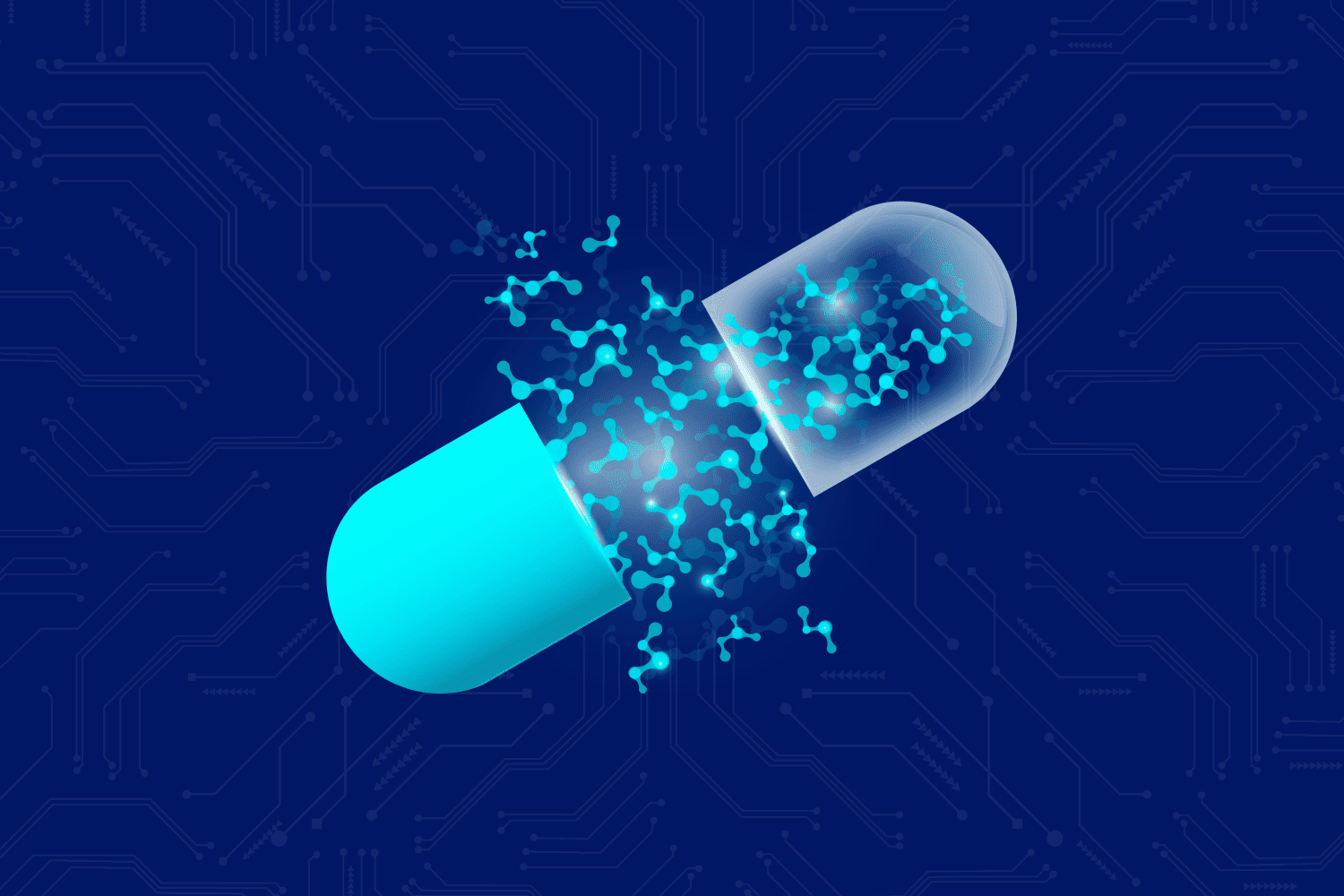Increasingly, artificial intelligence (AI) is transforming the delivery and speed of pharmaceutical drugs to the market. AI is solving challenges that come with traditional clinical processes, prompting a surge in AI-based initiatives aimed at reducing costs and expediting development timelines. Additional momentum is being fueled by advancements in AI technology, heightened awareness, and improved computer processing speed.
With a total addressable market of nearly $50 billion for AI-enabled drug development, it is estimated that 30% of new drugs will be discovered using AI by 2025. However, AI-based drug development is still in its early stage of adoption, and industry experts offer varied opinions on its overall progress and challenges.
Expert Insights in AlphaSense is your single-source solution for superior quality insights on AI solutions in pharmaceuticals. Below we explore this topic and the key industry debates by leveraging AlphaSense, specifically first-person insights from our expert transcript library.
The Timely Arrival of AI in Pharmaceuticals
Drug development is attracting a disproportionate share of AI investment dollars flowing into the healthcare sector due to its compelling return on investment. A BCG report released last year estimated that AI could yield time and cost savings of at least 25%–50% in the drug discovery steps leading up to the preclinical stage.
Provided that the goal of AI is to develop systems that can perform, enhance, and augment tasks that typically require human intelligence, it is no surprise that AI is solving many of the challenges of traditional clinical drug development. A former pharmaceutical company executive assessed the value drivers of AI within the industry, as well as how it stands to accelerate drug development and reduce failures early-on in the research process:
“[Drug] discovery is where the biggest investment is being made at the moment… In discovery, anything that can [drive] improvement could have dramatic consequences on the return of investment downstream, the net present value, for example. It’s more or less understandable that the most [AI investment] is there.
As a grim reaper, [AI] is really good. It can catch, let’s say, possible toxicology effects so that you can kill a potential molecule much earlier. Does it increase the probability of technical success? No. What it does is it reduces the aggregate cost. You will still need 22 projects to get one [candidate], but you will be able to kill the [first] 21 much earlier.”
– Associate Director, Pharmaceutical Company | Expert Transcript
Identifying Drug Targets and Candidates
Traditional methods are mostly based on singular hypothesis-driven approaches and are limited by human capacity to analyze multi-dimensional data, which means they are prone to human error and bias.
A former biotech executive shared their expert perspective on specific challenges in the clinical development process that AI solves for identifying drug targets and candidates:
“AI and ML and analytics, basically these are ways to really take vast amounts of disparate data, and when queried in the correct way, can provide some insights that you just can’t do single-handedly in the human mind.”
– Former Managing Director, Biotech Company | Expert Transcript
AI takes a more holistic approach by analyzing vast and diverse datasets to expedite and improve the accuracy of identifying drug targets and candidates.
Clinical Trial Design and Patient Recruitment
Designing efficient clinical trials with suitable patients can be challenging. Clinical trials often involve relatively small and homogeneous patient populations.
AI assists in optimizing trial design, predicting patient responses, and improving patient recruitment. It also analyzes patient data from real-world sources across a wider demographic, which has become increasingly important for regulatory approval according to FDA guidance issued last year.
“[A] key opportunity [for AI] is the optimization of clinical trials, optimization of clinical trial design, optimization of the numbers of subjects, optimization of the patient selection, patient selection criteria… That’s a huge area of opportunity.”
– Former Senior Vice President, Biotech Company | Expert Transcript
Collaborations on the Rise
With a sizable total addressable market on the horizon, the main players looking to capitalize on AI drug development trends are biopharma companies with a strong AI focus, and providers of AI tools. Providers of AI platforms serve as partners and collaborators with biopharma firms by offering vast databases for feeding AI models, deep AI expertise, or AI platforms that can be applied across a range of products and therapeutic areas.
Experts believe AI providers that have the most established relationships with large biopharma companies are best positioned in the market:
“A number of companies that have started out like Recursion, Exscientia, BenevolentAI, Owkin, maybe they’re five-, six-, seven-years old, they’ve really started to come into their own now and get the credibility with the pharma companies that they’re trying to partner with. They’re actually delivering now in terms of the promise of the application of advanced analytics.
What I’m just starting to see is that people are leaving the pharma companies and joining these [AI tools provider] companies. It’s been really important to get experienced drug developers in these AI analytics companies, and so that’s happening now.”
– Former Managing Director, Biotech Company | Expert Transcript
Clinical Pipeline Reflects AI Momentum
The pipeline of AI-derived pharmaceutical assets continues to expand, with 15 AI-derived drug candidates in clinical trials. One company in particular has been garnering attention–Hong Kong-based Insilico Medicine–for making the first drug entirely based on AI.
Insilico Medicine developed INSO18-055 for the treatment of idiopathic pulmonary fibrosis (IPF) with the first AI-discovered molecule that was based on a novel AI-discovered target. A senior scientist with an AI platform provider shared their expert perspective on Insilico’s groundbreaking advancements:
“Insilico Medicine has [been] democratizing their own internal platform, which I think is really cool. They’re essentially saying, ‘We’ve developed these algorithms, the generative algorithm to identify new molecules and also our predictive models, and we’re making those models and algorithms available to you as a fee-for-service.’ They’re using that internally for a set of targets and then also partnering with large- and medium-sized pharma companies.”
– Senior Scientist, AI Provider | Expert Transcript
Track Key Trends in AI-Driven Pharmaceuticals
The pharmaceutical industry is rapidly evolving with the surge in AI-driven clinical capabilities, bringing efficiencies and solutions to challenges. As dynamics continue to unfold in AI-based drug development, new questions will most certainly arise. AlphaSense can help you monitor and surface developments with the help of powerful AI technology and first-person expert insights.
With Expert Insights, you can stay ahead of the trends and reduce the time it takes to find critical market insights so you can allocate more time to strategic decision-making.
Discover more expert perspectives on AI-driven drug development in our report, How Artificial Intelligence is Reshaping Drug Development.
Evolve your primary market research across the healthcare sector when you start your free trial with AlphaSense today.




